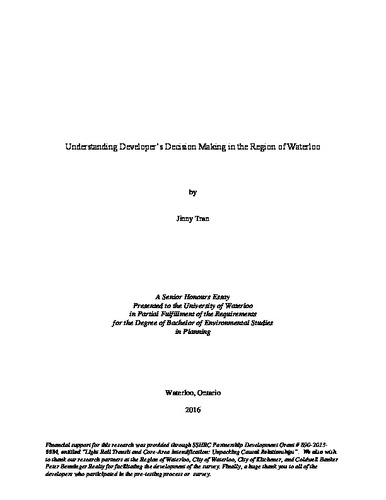| dc.description.abstract | Land development--the conversion of lands to occupiable structures--represents the collective
activities of key agents, including: regulators (governing bodies), land developers, real estate
agents, and consumers in the market. Individual agents have different roles in the land
development process. In the past, there have been many attempts to model their complex
interactions (e.g. Schaeffer and Hopkins, 1987; Lai, 2001); however, these models inadequately
account for factors that influence the behaviours of key agents (Gore & Nicholson, 1991;
Coiacetto, 2001). More specifically, there needs to be further research and understanding of the
key agent in the model: land developers.
Land developers are the primary drivers of change in the development process; they propose
what to build, where to build, when to build, and how much to sell it for (Bourne, 1976;
Coiacetto, 2001; Morgan, 2010). Different from other agents in the development process, land
developers are involved for the entire duration, from acquiring land to selling the final product
(Miles et al., 2000). As noted in a literature review conducted by Antanaitis (2015), there are
limited empirical studies available that target individual developers using key informant
interviews. Many existing models use assumptions about developer behaviour that are often
overly simplistic and are unable to account for the complex decision-making strategies of
developers and other agents (Knapp et al., 1998). Key informant interviews are useful in
providing an in-depth understanding of how and why certain factors affect developer’s decision
making, as well as revealing potential patterns in their behaviours. This richer information could
in principle lead to improved models of developer behavior.
Furthermore, developer behavior can be highly location-specific. For instance, studies of
developer typologies (e.g. Bourne, 1976; Fainstein, 1994; Kenney, 1972; Winarso, 2000)
discovered that heuristic learning (an approach to problem solving by using general knowledge
and experience, also known as using a rule-of-thumb) of land developers varies between
geographic areas. Developers’ strategies are affected by local community characteristics such as
demographic trends and political structure. Our study focuses on the behaviours and decisionmaking
of developers in the Region of Waterloo, one of the fastest growing regions in Ontario,
Canada. In addition to building a better understanding of the behavior of local developers, we
intend to use the results of the research to build a location-specific model of developer
behaviour. The study will also lay the groundwork to compare developers’ behaviour pre-andpost
implementation of a planned light rail transit (LRT) system in future research | en |

